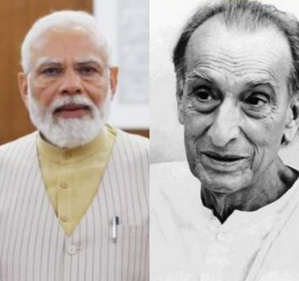New Delhi: Prime Minister Narendra Modi paid heartfelt tributes to Acharya J.B. Kripalani, the former President of the Indian National Congress and a prominent freedom fighter, on his birth anniversary on Monday.
Acknowledging Acharya Kripalani’s significant contributions to India’s Independence movement, PM Modi shared his thoughts on social media platform X, highlighting the values of democracy, integrity, and social justice that the freedom fighter embodied.
“Remembering Acharya Kripalani on his birth anniversary. He was a towering figure in India’s freedom struggle and an embodiment of intellect, integrity and courage. He was deeply committed to democratic values and principles of social justice,” said PM Modi.
The Prime Minister further expressed his government’s continued dedication to fulfilling the freedom fighter’s vision of a prosperous and strong India, where both the poor and marginalised are empowered.
“Acharya Kripalani was unafraid to fight injustice. We reiterate our commitment to fulfilling his noble vision of an India that is prosperous, strong and where the poor as well as marginalised are empowered,” he said.
Acharya Kripalani, born on November 11, 1888, in Hyderabad, Sindh, played a key role in India’s struggle for Independence. He was the President of the Indian National Congress at the time of India’s Independence and served in various critical roles, including in the Interim Government of India (1946-1947) and the Constituent Assembly of India.
Acharya Kripalani’s political journey saw him rise to prominence within the Congress. His first major post was as the General Secretary of the All India Congress Committee in 1928–29, and he held the position of General Secretary again from 1934 to 1945. In 1946, he was elected as Congress President, although his tenure was marked by controversy due to his differences with Pandit Jawaharlal Nehru, who objected to Acharya Kripalani’s involvement of the party in governance post-Independence.
Acharya Kripalani’s critical views on the partition of India and his condemnation of the Congress leadership, particularly in his autobiography ‘My Times’, further highlighted his ideological stance, leading to his resignation as Congress President later in 1947.
–IANS


Comments are closed.